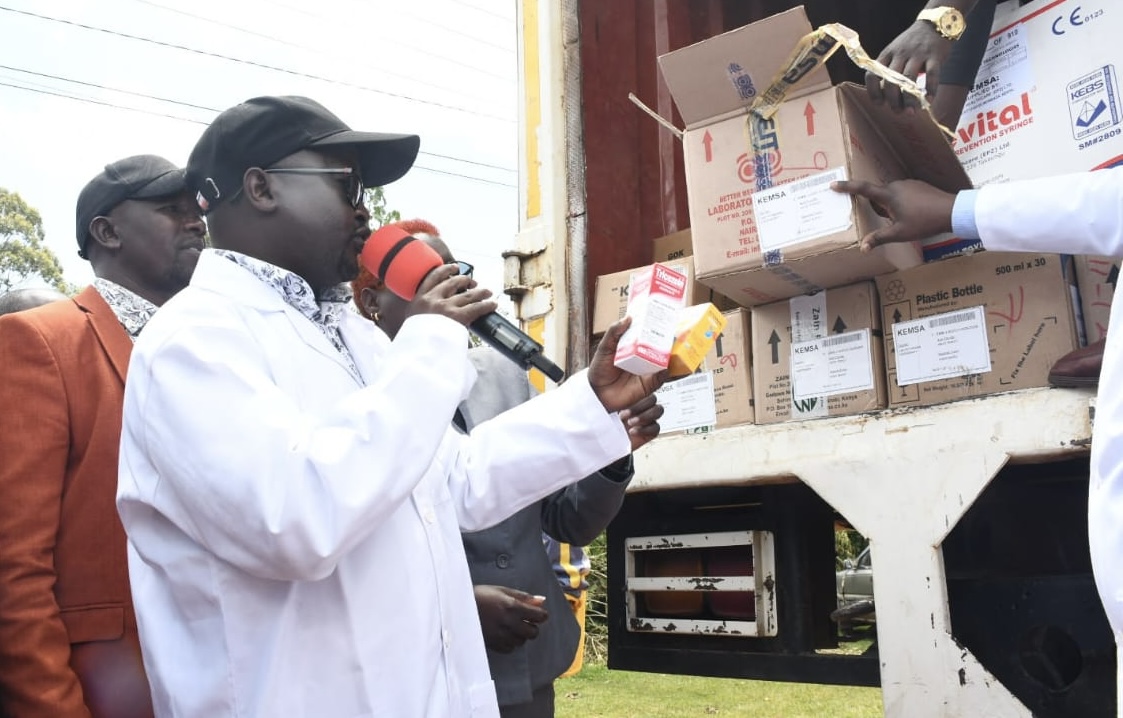
 West Pokot Deputy Governor Robert Komolle inspects medical supplies to
be distributed to county hospitals /MATHEWS NDANYI
West Pokot Deputy Governor Robert Komolle inspects medical supplies to
be distributed to county hospitals /MATHEWS NDANYI
Deputy Governor Robert Komolle flagged off 10 trucks carrying essential drugs and medical supplies worth sh 60 million from the Kenya Medical Supplies Authority.
The consignment will be distributed to 158 health facilities across West Pokot, ensuring uninterrupted delivery of quality healthcare services to residents.
Komolle reaffirmed the government’s commitment to strengthening healthcare systems in the region.
He also commended the partnership with Kemsa in enhancing access to essential medicines.
“We are working closely with Kemsa to ensure that we have timely delivery of drugs to our hospitals, so that we do not experience shortages again,” he said.
He was accompanied by Health and Sanitation CEC Claire Parklea, Chief Officer for Health Chebet Mungo, and a delegation from Kemsa led by Director Zachariah Muya.
“This consignment is a lifeline for our communities and a significant step towards a healthier future for the people of West Pokot,” Komolle said.
He cautioned county workers to ensure that the medical supplies are not diverted but used to benefit residents seeking medical assistance.
“As a county, we have also put in place measures to ensure that our health systems work for our people as health remains a priority for our people”, he said.
West Pokot county has recently employed an additional 346 health workers to boost health service delivery especially in rural areas.
The new workers include nurses and other cadres who will be sent to the county health facilities as from this week.
Governor Simon Kachapin three weeks ago held a meeting with the newly recruited health workers from all 20 wards in West Pokot.
The new workers have been deployed across various health facilities to enhance service delivery and support the county’s growing healthcare infrastructure.
Kachapin urged them to approach their new roles with dedication, compassion and professionalism.
He emphasised the critical role they will play in improving access to quality healthcare, particularly in remote areas where medical services remain limited.
“We are still working to ensure our people access the best health services and your role will be to enhance what we have done so far,” he said.
Kachapin said the new employees will be provided with necessary support to perform their duties but they must be ready to serve residents with dedication.
“The true measure of public service lies in your willingness to serve even in the most underserved communities.”
Kachapin said many families in the region still faced significant challenges in accessing basic healthcare, and the presence of the new workers brought much-needed relief to residents.
He highlighted the government’s investments in expanding and equipping health facilities.
He noted that infrastructure alone was not enough without committed and qualified personnel who are essential to achieving meaningful and lasting impact.
He also encouraged residents to take advantage of the improved services and to register for the Social Health Authority (SHA) so that they access affordable, accessible, and consistent healthcare coverage for all.













